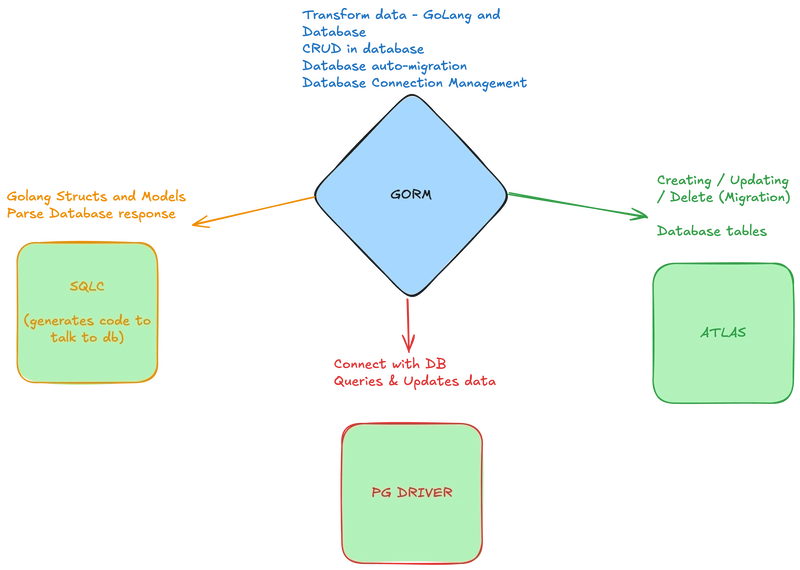If you are still using GORM, Let me tell you there is a better alternative. Over the past few weeks I have been exploring the best way possible to communicate with my database.
So I turned to benchmark results and take the most performant one off the shelf. But the problem was all of them had mixed views. Gorm was winning for how easy it is to bootstrap and supports multiple databases and where as sqlx and sqlc are were some of the popular libraries know for its speed.
Hi, I am software engineer and been working with GoLang for 3 years. If you are still here and Enjoy the art of building and experimenting with Code. Please consider subscribing YouTube Channel.
When building Go applications with PostgreSQL, GORM is often the go-to ORM because of its simplicity and developer-friendly API. However I had fare share of nightmares using ORMs especially with Postgres. This versatile database supports more essential Data-Types that are not natively supported in GORM.
Of course you can implement custom type, but doesnt that defeat the whole purpose of Using GORM for simplicity.
What is the best ORM?
- Flexibility over Queries and SQL
- Easy Schema Migrations
- Safety from SQL Injections
The Inherent problem with every ORMs
- Complex unoptimised queries for simple requests
- Less flexibility for optimization
- Hard to execute rollbacks and transactions
Why SQLc + pgx/v5 + atlas
- Less boilerplate
- Type safety
- Idiomatic Go Code
- Easier to understand and maintain
Build Your Own ORM like Legos
📌 What is This Database Stack?
Pgx: A performant PostgreSQL driver and toolkit for Go. Think of it as the standard library database/sql on steroids.
Sqlc: Generates type-safe Go code from your SQL queries at compile time.
Atlas: Modern database schema management tool, similar to Flyway or Liquibase, with clean DSL and migration workflows.
🚀 Benefits Over GORM
1️⃣ Type Safety and Compile-Time Validation
GORM: Relies on runtime reflection. Mistyped column names or queries can slip into production.
sqlc: Parses your SQL and generates Go code with exact struct types. If your query or schema changes, your code won’t compile until fixed. Safer, cleaner, no surprises.
2️⃣ Better Performance
- pgx is faster than database/sql+GORM because:
- No reflection overhead.
- Direct native support for PostgreSQL types.
- Optimized connection pooling.
- Support for advanced features like COPY, notifications, and batch queries.
Benchmarks consistently show pgx outperforming GORM by 30-50% in high-throughput systems.
3️⃣ Clear, Explicit SQL Control
GORM abstracts away SQL, which is fine until you need complex queries, CTEs, window functions, or JSONB operations.
sqlc lets you write native SQL — as expressive as you need — and still benefit from type-safe Go code generation.
You control the query plan, indices, and joins — not the ORM.
4️⃣ Schema Migrations Done Right with Atlas
GORM Migrations: Rudimentary. Often rely on auto-migrate at runtime (risky in production).
Atlas: DSL or declarative SQL migrations. Tracks schema state, detects diffs, and generates migration scripts safely.
5️⃣ Simpler Debugging and Maintenance
- No hidden ORM-generated queries.
- You can log, EXPLAIN ANALYZE, or optimize your SQL directly.
- Easier for any PostgreSQL DBA or Go dev to audit.
✅ When to Pick GORM Instead
To be fair — GORM still makes sense for:
- Quick prototypes.
- Small internal tools.
- Teams unfamiliar with raw SQL.
But for high-performance systems, analytics-heavy apps, or codebases where correctness and maintainability matter, pgx + sqlc + Atlas is superior.
🎯 Final Thoughts
Go’s superpower is simplicity and performance — and your database layer should reflect that. GORM trades safety and speed for convenience, but tools like pgx, sqlc, and Atlas give you the best of both worlds: developer ergonomics and production reliability.
If you care about type safety, performance, and clean database management in Go, it’s worth making this switch.



Top comments (0)